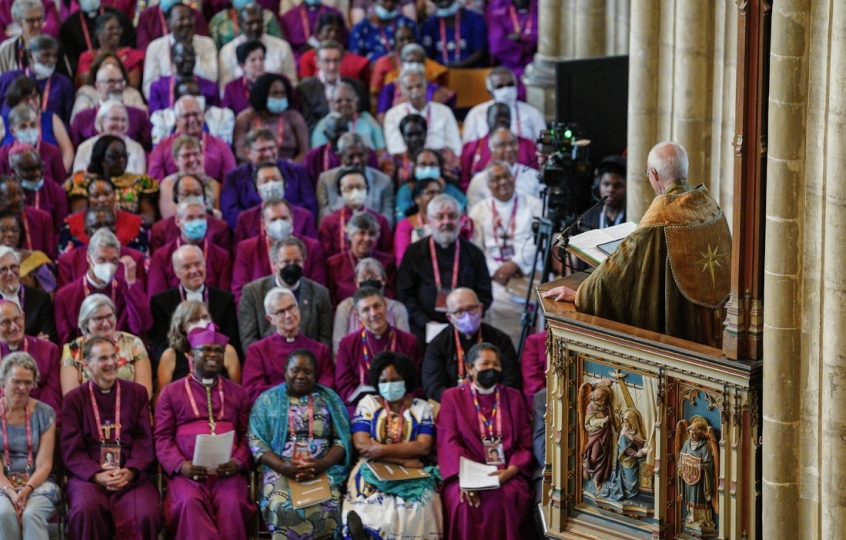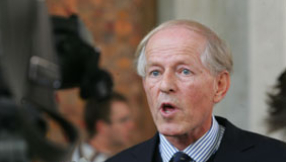
Recently the once-popular TV soap opera Neighbours came to an end after 37 years on the air.
Media website Digital Spy reported that 'the finale was an emotional one,' as the once-compelling story of community bickering, clashes and attempts at neighbourliness finally shuffled off into its grave. Which, for some inexplicable reason, brings to mind the Anglican Communion.
As most readers will be aware, bishops from around the world have been meeting for an event known as 'Lambeth 2022'. It's a gathering that happens every 10 years or thereabouts. So how has it gone? Has it been – like the recent Neighbours finale – a last hurrah? Or is it – like Love Island – going to somehow keep going despite widespread incredulity that such a thing should even exist in the 21st century? There is, I think, both bad news and good news.
Firstly, at least from what I can see, it was a bad week for Justin Welby, the Archbishop of Canterbury. Poor man – he has the most impossible job, of course, and struggles with depression, which is a monster. We can all recognise the enormous pressure he must feel, and he seems, whatever else might be said, a sincere and well-meaning man who loves the Lord for sure. Some people I trust heard him speak locally not so long ago and said he was excellent.
But he seems to have lost the plot on sexuality. How else to explain his assertion, in the context of different Anglican churches holding diametrically opposing positions on the issue, that, "We do not... go down the road of expelling other Christians?" The Apostle Paul would beg to differ. He told the Christians at Corinth that they should expel those living in sexual immorality (1 Corinthians 5v13).
It is true, of course, that he personally cannot expel whole national groups (such as the US Episcopalians) from the worldwide Anglican Communion. But he could give a lead among Primates in enforcing some sort of discipline (which has happened before). He could give a lead in enforcing Godly discipline in the Church of England.
By contrast, a recent Synod of the Orthodox Church in America got it right, stating that "those who refuse correction" in this area "open themselves to ecclesiastical discipline". The Orthodox statement is well worth reading in full – it is gracious, clear, orthodox (in its widest sense), pastorally kind but doctrinally clear - everything most readers of this website would hope for. The contrast with Justin Welby's line is stark, and telling.
There's another issue with the Archbishop of Canterbury's actions this week: his letter to bishops about the Lambeth Conference resolution of 1998 in relation to sexuality. In this, he said he wished "to affirm that the validity of the resolution passed at the Lambeth Conference 1998, 1:10 is not in doubt and that whole resolution is still in existence." It was a classic Anglican fudge – simply stating the facts, but not necessarily supporting them, nor indeed opposing them. And this from the leader of the worldwide Anglican Communion!
Interestingly many of those present at Lambeth itself seem to think Justin Welby has had a good week. Well, they are of course entitled to that view. But it is easy to get swept along in the internal emotional dynamic of an intense event such as this (in which many of the participants are personally invested as well) without seeing how it looks from the outside – in other words, being so much involved in the thick of things that it becomes impossible to see the wood from the trees.
For once, I find myself in agreement with liberal campaigner Jayne Ozanne who wrote on Twitter: "I've returned from Lambeth Conference with a very heavy heart. It is clear the focus is 'unity at all costs'..." And she's right. Unity based on fudge and evasion is no unity at all. As I understand it from the Bible, true unity comes from being united in the truth of Scripture under the authority of Scripture.
Secondly, it was perhaps a bad week for evangelicals in the Church of England. Once again, sadly, it is the "leadership question". Clergy in the parishes (like me) and lay people in the pews need to know that their leaders are there for them. We need to know they have a plan. We need to be inspired and encouraged in our weekly labours for the gospel. That was not the case, sadly, with Lambeth.
Three cheers for Bishop of Durham Paul Butler who spoke on Times Radio defending the orthodox position on sexuality. But many if not all evangelical bishops seemed silent. Perhaps they think the 'Living in Love and Faith' process forbids them speaking out. Well, possibly – but I am not persuaded the New Testament allows such lassitude in contending for the faith.
There were those, of course, who were busy giving what at least felt like something of a public lead for evangelicals in the C of E – Susie Leafe, of Anglican Futures, and theologians Ian Paul and Andrew Goddard. Thank you to them all.
Thirdly, there was some encouragement. For let us give a huge cheer for the leadership – I almost want to write the word in capitals... in fact I am going to – LEADERSHIP! – of the Global South Fellowship of Anglican Churches (GSFA). Don't you just want to rejoice when you read the clarity of their press release last Friday? What a joy! This is what Godly, Biblical episcopal leadership looks like! YES! Oh that we had such leadership in the Church of England!
So, finally, let us ask – where does the Anglican Communion go from here? The GSFA puts it like this: "We find that if there is no authentic repentance by the revisionist provinces, then we will sadly accept a state of 'impaired communion' with them." This will involve "visible differentiation" from non-orthodox provinces, they say. Which effectively, to my mind, does mean the end of the Anglican Communion – at least as it was once, and is supposed to be.
And what about the Church of England? One of the latest posts about Lambeth on the Anglican Futures blog sums it up neatly: "If it is right the markers of an apostolic church are: clear doctrinal boundaries, sacramental discipline and... discipline of ministers in matters of morality, where is the Church of England now left?"
Above the parched earth of this dry and weary land, the question hangs as a portent in the still summer air.
David Baker is Contributing Editor to Christian Today and Senior Editor of Evangelicals Now, available at https://www.e-n.org.uk in print and online. Use the code Keswick22 to gain a 20% discount on the first year of a new full subscription (print and online) for the first year (offer expires 15th August). He writes here in a purely personal capacity.













